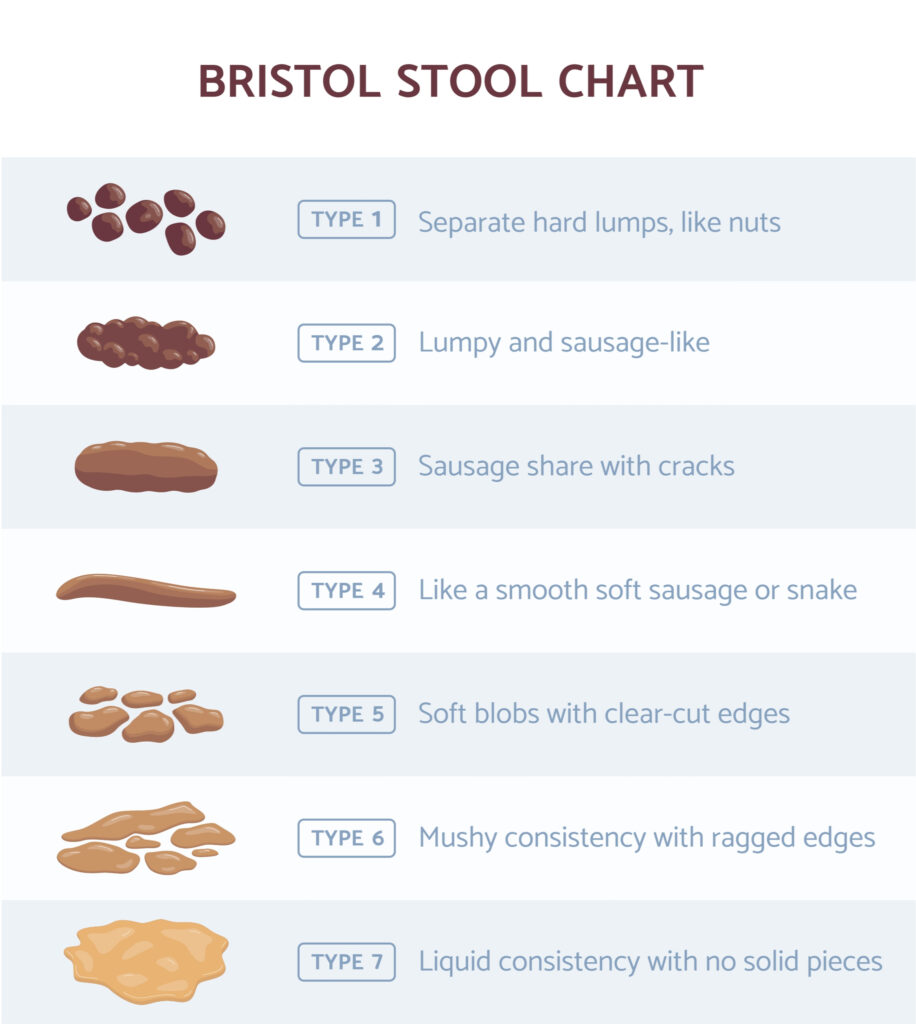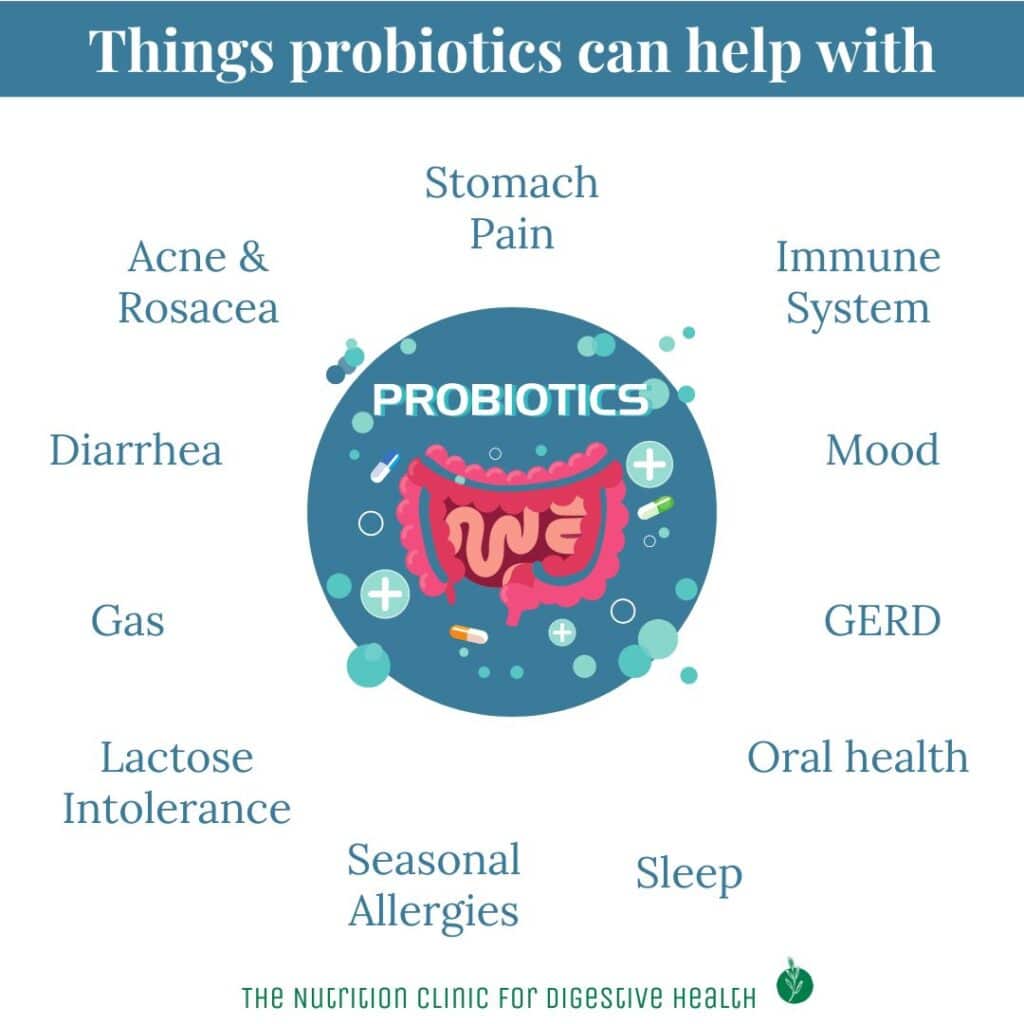Table of Contents
What Are Probiotics?
We might be biased because of our line of work…but we’re assuming you’ve probably heard about probiotics.
As with any supplement in the nutrition world, marketing messages and other people’s amazing experiences with probiotics can make things confusing. Especially if you’ve tried a probiotic and didn’t get the results you had hoped for.
While probiotics can make a HUGE difference for people, they aren’t necessarily a magic bullet.
If you’re wondering if the money you’re spending on your probiotic is worth it – read on!
Today we’re talking about:
- What symptoms probiotics help with
- How to know if your probiotic supplement is working for you.
- Tips for ensuring you’re taking the right probiotic for your unique situation! This is also known as the right strain – more on that, too.
So what exactly is a probiotic?
Probiotics are microorganisms that maintain or restore beneficial bacteria to the digestive tract. They come in three main forms – most of this article focuses on the supplement form of probiotics.
- They can be taken as a supplement – typically sold as capsules or powders, but you may also see tablets, mouthwash, and lozenges.
- Probiotics naturally occur in cultured or fermented foods – yogurt, kefir, kimchi, sauerkraut, kombucha, miso and natto.
- They can also be added to foods in processing, such as banana chips, fruit bars, granola, and beverages like coffee and herbal teas.
How Long Does it Take for Probiotics to Work?
Positive results are typically seen within 4 weeks of starting a probiotic supplement (26). Some people may get results within just a couple of days!
- After a month of being on the probiotic, if you aren’t seeing a change in your symptoms, it could be time to look at a different one.
- If you don’t have any issues you’re trying to solve with a probiotic and are taking one for general health and wellness, that’s great! You may have some digestive discomfort as your body adjusts, but that’s normal and should only last a few days. In this case, no change in symptoms would be a good thing.
- It’s also important to note that once your probiotic starts working, you might need it long-term. This is due to a protection mechanism of the body that makes it difficult for new bacteria to live and thrive in the gut. This helps the body resist pathogenic bacteria.
- But this also means most probiotic supplements are only helpful while you’re taking them. In other words, to really get the benefit of probiotic supplements, you need to continue to take them (27).
Can You Take Too Many Probiotics?
Probiotic strains are measured in colony-forming units or CFUs.
For reference…
- Typical probiotic supplements range anywhere from 4 million CFUs to 50 billion CFUs.
- Visbiome, a commonly used probiotic for Ulcerative Colitis and Crohn’s disease, is a high-dose probiotic containing between 112-900 billion CFUs.
Taking more probiotics isn’t necessarily better – too many probiotics can make you feel worse and cause bloating, gas, stomach pains, diarrhea, and/or constipation (28).
We recommend starting low and going slowly when starting a probiotic – increasing your dose as your body adjusts. This may look like starting with ¼ of the recommended dose for a week, then, if tolerated increasing to ½ the recommended dose for a week, then if tolerated increasing to ¾ the recommended dose, and so on…
Can Probiotics Cause Constipation?
If you started a probiotic and became constipated, or your constipation got worse, it could be because you’re taking:
- The wrong strain
- Too much
- Prebiotics in your probiotic (these feed bad bacteria, too – see the SIBO probiotics section below for more on this)
- A low-quality probiotic with added ingredients that you’re reacting to, like corn, sugar alcohols or stevia, to name a few
We recommend trying a different high-quality probiotic from Fullscript before writing off probiotics altogether.
Signs Your Probiotics are Working
There are several things to keep in mind when purchasing a probiotic:
- Quality
- The strain of bacteria or yeast (different strains help with different symptoms)
- Dosage (see information on CFUs above)
- Prebiotic fibers such as inulin and FOS can cause bloating, gas, or constipation (so depending on your symptoms and reasons for wanting to try a probiotic, you may need to watch out for these!)
Based on the available research, here are the signs that your probiotic is working:
1. Do Probiotics Help With Diarrhea?
If you have diarrhea, supplementing with probiotics can reduce the frequency of bowel movements and improve the consistency of your stool (1). In other words, you’ll poop less often, and your poop will also be firmer!
You should see a change in your stool consistency in just a few days once beginning to take the probiotic (2, 3).
Based on the Bristol stool chart, your poop consistency should typically be a type 3 or type 4.
If diarrhea isn’t your issue, but you suffer from constipation, be sure to read our in-depth breakdown on how probiotics can help you poop.
2. Do probiotics help with gas?
Excessive gas can occur due to the following:
- The breakdown of indigestible carbohydrates, known as FODMAPS: high FODMAP foods include a variety of foods such as beans, lentils, wheat, and apples.
- Monash University, the leading FODMAP researcher, has a comprehensive list you can read here.
- Swallowing too much air from eating or drinking quickly, chewing gum, or smoking
- Carbonated drinks (soda, beer, and flavored waters)
- Conditions such as IBS, food sensitivities, or food intolerances.
While gas is a normal part of life, it can become problematic if it happens too often or is excessively smelly!
Upon analyzing 33 clinical trials, it was found that taking probiotic supplements reduced the frequency of gas (4). So if you suffer from the embarrassment of too much or stinky gas, probiotic supplements are worth a try (your family will probably thank you 😉)!
3. Probiotics and visceral hypersensitivity (stomach pain)
One of the hallmark symptoms of irritable bowel syndrome (IBS) is pain in the organs involved in digestion – this is also referred to as visceral hypersensitivity (VH).
People with VH have a lower threshold for pain in their internal organs, so things that wouldn’t bother someone without VH (like digesting a meal) can be painful for someone with VH.
If you have VH, digesting food can be painful due to increased sensitivity of the stomach and gallbladder. Also, when food or gas travels through the intestine, the intestines will expand, causing pain in those with VH.
Probiotics were found to lessen abdominal pain and sensitivity (5).
4. Probiotics for GERD
Gastroesophageal reflux disease, GERD, occurs when food that has entered the stomach refluxes back into the esophagus. Because this food now contains stomach acid (which is highly acidic), this is really painful and burns the lining of the esophagus.
Symptoms of GERD include nausea, abdominal pain, gas (including belching, gurgling, and burping), regurgitation, and heartburn.
Typical GERD treatment involves using proton pump inhibitors which, when used for 6+ months, can have many terrible side effects (37).
Impact of Long-Term Omeprazole Use:
We recommend avoiding using omeprazole and other PPIs long-term because they can cause (36):
- Low stomach acid, which leads to burping, gas, bad breath, constipation, nausea, vomiting, or feeling full after meals
- Nutrient deficiencies (specifically B vitamins, iron, magnesium, calcium, etc.)
- Imbalances in the gut microbiome
- Small Intestine Bacterial Overgrowth (SIBO)
- GERD to worsen (ironically)
- Headaches
- Pneumonia
- Osteoporosis
Probiotic supplements have been found to reduce the amount of GERD episodes and improve the related symptoms (6).
We recommend using probiotics as part of a GERD treatment plan.
5. Probiotics and Immune System
Because 70-80% of the immune system cells are located in the gut, it makes sense that your gut microbiome will impact the functioning of your immune system.
Probiotics can be anti-inflammatory, calming down the immune system when overactive, or be pro-inflammatory, stimulating the immune system when necessary (7, 8).
Probiotics can influence the immune system to:
- Respond quickly and efficiently to infections reducing cold and flu illnesses (9)
- Reduce the duration of respiratory tract infections (9)
- Improve function specifically in athletes (10)
6. Mood Boosting Probiotics
Probiotics can help depression by impacting the gut-brain axis through chemical or neurotransmitter production (GABA, serotonin, and dopamine) (16, 17). All of these neurotransmitters play an important role in regulating mood.
Probiotics help the body metabolize vitamins more efficiently, specifically vitamin K and B-12, which are building blocks for many neurotransmitters.
7. Probiotics for Lactose Intolerance
Lactose intolerance is super common (around 65% of the population has it) and causes some awkward symptoms, including (18):
- Diarrhea
- Excess gas
- Abdominal pain
- Mucus in stool
- Nausea
- Vomiting
Probiotic supplementation was found to reduce the symptoms of lactose intolerance, making dairy products easier to digest (18).
8. Probiotics and Allergies
Probiotics can reduce runny nose and red eyes associated with seasonal allergies by:
- Reducing histamine levels (19)
- Working to correct dysbiosis (dysbiosis is associated with a greater risk of allergies) (20, 21)
- Calming down an overactive immune system (22)
- Reducing intestinal permeability (helping to heal a leaky gut) (23)
Histamine and Probiotics
Histamine is a compound that the immune system releases when triggered by a potential allergen. Histamine helps to get that potential allergen out of your system through sneezing, itching, running nose, or tearing eyes.
Although histamine is necessary and serves many purposes, too much can cause rashes, swelling, heart palpitations, and difficulty breathing.
Here’s another interesting nuance when it comes to probiotics – some probiotics break down histamine while other probiotics produce more histamine!
If you struggle with allergies, you should avoid histamine-producing probiotics and use a probiotic that breaks down histamine instead.
| Probiotics that produce histamine | Probiotics that breakdown histamine |
| Salmonella typhi | Bifidobacterium infantis |
| Lactobacillus casei | Bifidobacterium longum |
| Lactobacillus d. bulgaricus | Lactobacillus plantarum |
considered helpful in some people, but yet harmful if you are prone to producing excess histamine.
9. Probiotics for Sleep
Since the gut microbiome is linked to sleep, it makes sense that supplementing with probiotics can help improve insomnia, improve the quality of sleep, reduce brain wave activity during sleep, and reduce fatigue (24, 25).
10. Probiotics for Acne
According to research, the overgrowth of bacteria and inflammation play a role in the development of acne (11).
Probiotics have been proven to improve skin health by:
- Reducing the acne-forming bacteria
- Modulating moisture (not too much and not too little)
- Strengthening the outermost layer of the skin (aka the skin’s protective barrier), which is compromised in acne, rosacea, and dermatitis (13, 14)
- Regulating the inflammatory process (12)
11. Probiotics for Teeth and Gums
If you suffer from gum disease or gingivitis (inflammation of the gums), probiotics in mouthwash or toothpaste can reduce the severity. Probiotics added to lozenges can reduce gum bleeding and plaque formation (15).
SIBO Probiotics
Small intestine bacterial overgrowth, or SIBO, occurs when too much bacteria is in the small intestine. To learn more about SIBO, check out this article, which covers it extensively.
Common symptoms of SIBO include:
- Bloating (a hallmark sign)
- Gas
- Abdominal pain
- Diarrhea and/or constipation
- Fatigue
- Weight loss
- Stiff joints
- Nutrient deficiencies
If you have SIBO, adding certain probiotics to a small intestine that already has way too much bacteria can make your symptoms worse.
Here’s another example of when understanding how to use different probiotics is really helpful: several probiotics contain prebiotics (sometimes called Symbiotics) that can feed the overgrown (problematic) bacteria in people that have SIBO. In this case, probiotics can make digestive symptoms worse.
Continuing to feed the overgrown bacteria makes it difficult, if not impossible, to get rid of. If you have SIBO, avoid prebiotics such as inulin or FOS until you address the overgrowth.
A probiotic we love that helps with SIBO is Megasporebiotic from Microbiome Labs. This is a soil-based (spore-forming) probiotic with a unique ability to force out overgrown bacteria. To order Megaspore, you can create a Fullscript account which will give you access to all of our favorite probiotics.
Who Shouldn’t Take Probiotics?
Although probiotics are generally considered to be safe, anyone who is immunocompromised should talk to their doctor before adding one to their supplement regimen. The reason is that if someone has a weakened immune system, there is the potential for any bacteria to pose a threat (even if it isn’t harmful).
People who should consult their doctor before taking a probiotic include but aren’t limited to:
- Anyone whose immune system is significantly suppressed. Typically we think of HIV and cancer patients, but this could also be if you’ve recently been in the hospital for a long time or have had major surgery. These scenarios put you at an increased risk for bacterial or fungal infections occurring in the bloodstream (30, 32).
- Anyone who has been hospitalized and was given a venous catheter due to the risk of contamination of the catheter (31).
- If you have severe acute pancreatitis, probiotics can increase the already heightened risk of infections (33).
Even though the overall risk of developing an infection due to probiotic supplements is extremely unlikely (34, 35), we recommend checking with your doctor if you fall into these categories or are otherwise unsure.
Our favorite probiotics
Since there are so many probiotic options to choose from, check out our Fullscript store for a list of the probiotics we commonly recommend.
For even more individualized support, work with one of our dietitians!
Conclusion
Taking the right probiotic can help with the following:
- Diarrhea
- Gas
- Stomach Pain
- GERD
- Immune system support
- Mood
- Lactose Intolerance
- Seasonal Allergies
- Sleep
- Acne & Rosacea
- Oral health (gum disease and plaque formation)
If you’re taking probiotics AND you still have the above symptoms, here are a few questions to ask yourself:
- Are you taking the right strain of probiotics?
- Is your probiotic being stored properly?
- What’s the recommended dose?
- Did you purchase a high-quality probiotic?
- Here are a few things to look for to assess quality:
- Does this supplement contain fillers or additives like sugar, sugar alcohols, or food colors?
- Does the company that made the probiotic do third-party testing for quality control?
- Here are a few things to look for to assess quality:





Leave a Reply